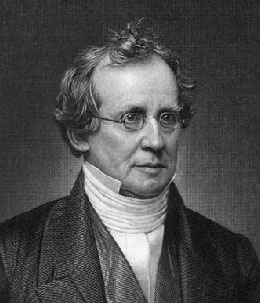 I’m really enjoying Paul Gutjahr’s biography of Charles Hodge (OUP 2011). I have a long way to go, but having skipped around a bit, I already see two critical lessons for every Christian, especially pastors and teachers.
I’m really enjoying Paul Gutjahr’s biography of Charles Hodge (OUP 2011). I have a long way to go, but having skipped around a bit, I already see two critical lessons for every Christian, especially pastors and teachers.
First, unchanging consistency in the service of truth is a virtue not a vice.
Critics of Hodge have long painted his comments about the Bible and the lack of originality at Princeton Seminary in the darkest hues possible, claiming that Princeton was hopelessly mired in its commitment to Reformed orthodoxy and biblical literalism. Hodge may have been a systematic thinker, but he certainly was not an innovative one. While the merits of such conclusions can be debated, such characterizations tend to devalue Hodge’s greatest gift: his utter consistency of conviction. He was a man who had the rare ability to adhere to a set of doctrinal positions for an entire lifetime. For some, such consistency might show an inability to change and grow. To others, it signals a passionate ability to remain true to one’s convictions. Taken in its original context, Hodge’s comment does capture the very essence of the man. He was not interested in theological innovation because he believed it impossible to improve on orthodox belief. The only things that were new in orthodox theology were various heresies, and Hodge had no interest in distinguishing himself as a heretic. His role, and the role of the Seminary, had always been to be guardians of orthodoxy, not creators of new strains of Christian doctrine. (363, emphasis mine)
Second, as you guard the truth, do it gladly.
Hodge may have had an incredible mind, but he touched lives in a more profound way through his pious and benevolent character. Those who knew him well were quick to recall a man “luminous with the spirit of the indwelling Christ,” and remembered him for his “[d]evout, reverent, sincere, fearless, intensely earnest and honest” character. Many agreed that his “genuine kindliness of heart and largeness of soul” challenged the Calvinist stereotypes of sternness and severity. Others recalled him as “the sweetest, gentlest and most lovable of men. His face itself was a benediction.” Hodge’s colleague William Green reminded those who had known Hodge of his “cheerful affability, rising at times into hilarity.” Hodge had loved to laugh, and he liked nothing better than a good joke or a humorous story. The editor of one journal wrote that he had “seldom seen a man more genial and attractive than this representative of the American Presbyterians” and that his “parlour-study [was] one of the cheeriest glimpses” he had ever had of the inside of an American home. In summing up Hodge, Lyman Atwater noted that there were precious “few men who had so many elements of greatness, with so little that one could wish otherwise.” Posterity might remember Hodge for his magnificent mind, but for those who know him best, what set him apart was his even-more-magnificent heart. (375, emphasis mine)
I like Hodge more and more with every page.


















